IoT devices are already widely deployed in urban areas. However, to grow, smart cities need a reliable and ultra-fast connectivity. This is how 5G will perfectly complement the existing technology network (4G, fiber, NB-IoT and public Wi-Fi), especially with its very high bandwidth and throughput and low latency.
The advent of 5G has real implications on smart cities and their different verticals. For instance, 5G will enable smart cities to use artificial intelligence to analyze the massive amounts of data collected in a city. With the very high speed of 5G, the large volumes of data can be fully exploited. Finally, the responsiveness of 5G (up to 10 times faster than the previous generation, with a latency of the order of a millisecond in the long term), is decisive for the rise of applications such as driverless vehicles, whose deployment is s real transformation for mobility in the city.
Furthermore, combined with artificial intelligence, 5G opens the way to concrete and innovative smart city uses, such as predictive analysis of mobility flows and their management in real time. This is why 5G will enable the full potential of smart city technologies.
Our goal, during this track of the IEEE 5G Summit, is to provide a platform for communications and collaboration between industry, government and research on the state-of-the-art in smart cities and 5G worldwide. The objective is to provide a clear picture of where we are today, where we are heading with the future of humankind and how 5G can serve as an accelerator in making smart cities a common reality across the globe.
The track shall have eminent speakers from Smart Cities, ICT & 5G areas sharing their perspectives covering the cross-cutting topics around the 5G & Smart Cities (Infrastructure) interplay like – Vision, Strategy, finance and Standards; Urban Planning, Infrastructure, Buildings and Security; Connectivity, Mobility and the Environment; and conclude with a Live Panel discussion providing some valuable actionable insights to the stakeholders of Smart Cities & 5G Ecosystems.
Session Speakers:
- Kris V. Libunao, Executive Director at SmartCT, Philippines
- Suhono Harso Supangkat, Director Smart Cities and Communities Innovation Center, Indonesia
- Vinod Bijlani, Lead, AI and IoT Practice for HPE, Singapore
- Waleed Khalaf, Chairman Bahrain Smart Cities Summit, Bahrain
- Shadrack Kubyane, Co-Founder Coronet Blockchain, South Africa
- Ray Walshe, Director of European Observatory for ICT Standards (EUOS), Ireland
- Heikki Almay, Chairman of Karugrid, Finland
- Jonathan Reichental, CEO, Human Future, USA
5G Smart Cities 2021 – Session 1
11.00/11.05
Introduction by Mohamed Essaaidi, Head of the Smart Systems Lab and Former Dean of ENSIAS (Rabat, Morocco) – Founder & Former Chair of IEEE Morocco
11.05/11.30
“Smart Cities in Developing Countries: How to Make it Work”, Kris V. Libunao, Executive Director at SmartCT, Philippines
11.35/12.00
“Smart City Framework Development”, Suhono Harso Supangkat, Director Smart Cities and Communities Innovation Center, Indonesia
12.05/12.30
“Rethinking Traffic Management with 5G”, Vinod Bijlani, Lead, AI and IoT Practice for HPE, Singapore
12.35/13.00
“Smart City Initiatives in Bahrain”, Waleed Khalaf, Chairman Bahrain Smart Cities Summit, Bahrain
13.00/14.00
Lunch. break
5G Smart Cities 2021 – Session 2
14.00/14.05
Introduction by Joel Myers, Chair of Smart Cities for the IEEE IoT Initiative – CEO of DOMILA LTD (Ireland)
14.05/14.30
“3 Ways Blockchain will Accelerate AfCFTA implementation”, Shadrack Kubyane, Co-Founder Coronet Blockchain, South Africa
14.35/15.00
“5G and Standards within the European Union”, Ray Walshe, Director of European Observatory for ICT Standards (EUOS), Ireland
15.05/15.30
“Sustainable and empowered communities”, Heikki Almay, Chairman of Karugrid, Finland
15.35/16.00
“Connected Cities are Smarter Cities”, Jonathan Reichental, CEO, Human Future, USA
Speaker Bios
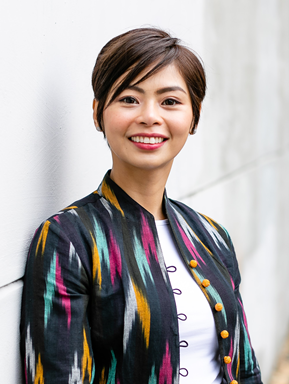 Kris Villanueva-Libunao, Executive Director at SmartCT, Philippines
Kris Villanueva-Libunao, Executive Director at SmartCT, Philippines
Kris has more than a decade of policy action research, urban planning, and strategic management consultancies. Currently, she is the Executive Director and Chief Sustainability Officer of SmartCT, improving the way smart cities and digital transformation are being developed in the Philippines and developing countries by evangelizing openness and people collaboration at the city level. She is trained under the ASEAN Smart Cities Leaders Programme of ASEAN Foundation and Data Stewardship under The Gov Lab of New York University and also serves as a Smart Sustainable Cities Instructor with IoT Academy and International Telecommunication Union Academy (ITU-Academy), Director for ICT and Cyber Relations of US-ASEAN Youth Council. Competencies: smart sustainable cities, urban planning, ASEAN, Philippines, project management, policy action research.
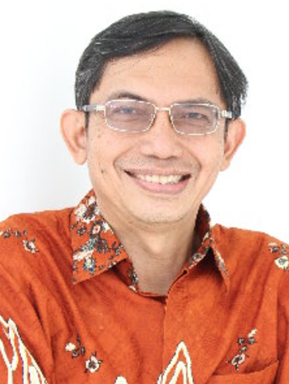 Suhono Harso Supangkat, Director, Smart Cities and Communities Innovation Center, Indonesia
Suhono Harso Supangkat, Director, Smart Cities and Communities Innovation Center, Indonesia
Prof Dr Suhono, was born in Yogya karta Indonesia, 3 December 1962. He received the B.S from Department of Electrical Eng. Bandung Institute of Technology (ITB) Indonesia in 1986 and holds Dr. of Engineering from Graduate School of Information System the University of Electro-Communication Tokyo Japan in 1998. From 1998-2002, he was secretary of Electrical Engineering Department Bandung Institute of Technology.
During 2002-2006, he was coordinator program on Graduate School of Information Technology in ITB. 2003-2009 Prof Suhono was assigned as a Chairman of Business Incubator Center at ITB. Since 2010, the center was extended become Institute for Innovation and Entrepreneurship Developmentand Suhono was a Chairman. Since 2000 he has been assisting some Government activities and industries, especially on Regulations an and IT Governance. From 2007 till 2009 he was appointed as Special Advisor to the Minister of Communication and IInformation Technology, Republic of Indonesia.
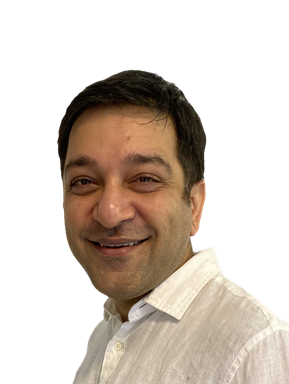 Vinod Bijlani, Lead, AI and IoT Practice for HPE, Singapore
Vinod Bijlani, Lead, AI and IoT Practice for HPE, Singapore
Vinod Bijlani leads the AI and IoT Practice for HPE. He has contributed to the design and implementation of smart city projects and established intelligent public transportation and traffic ecosystems in India, Singapore, and the U.S. He has over 22 years of experience in creating solutions and is a distinguished inventor with 25 patents in AI and ML technologies. He actively shares his experiences by speaking at international forums, mentoring start-ups, and publishing articles. Vinod has been working with standards organizations, such as the IT Standards Committee Singapore (ITSC-SG) and TM Forum, building standards on AI Security and Video Analytics. He is also the lead mentor with IoT Tribe SG where helps nurture young, aspiring entrepreneurs. For more details on Vinod’s professional background, please refer to www.vinodbijlani.me
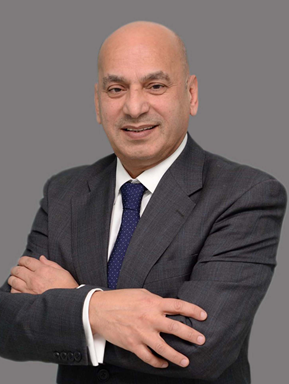 Waleed Khalaf, CEO of Smart Way Consultancy, Bahrain
Waleed Khalaf, CEO of Smart Way Consultancy, Bahrain
Waleed is currently the CEO of Smart Way Consultancy, Bahraini based multidisciplinary advisory firm that specializes in Smart Technology & Sustainability consultancy. He holds an MBA from University of Wales (1992) and a BSC in Telecommunications (South Shields College of Technology, UK 1987). Waleed has over 40 years of experience in telecoms and technology. He started his career in Batelco at 1987 as a controller marine communications. He then progressed to various managerial positions in Batelco including Manager of Call Centers (1992-1995), Manager of Customer Services Department (2000-2004) and Manager of Public Relations (2004-2005). In 2005 he joined Mena Telecom as VP Sales and Marketing.
Waleed then moved on to establish T-Linx Technology Solutions & Telecoms Advisory in 2008. In 2017 Waleed founded Smart Way Consulting to focus on providing consultancy solutions and advisory on smart technologies and sustainable solutions for smart cities. Waleed also chairs the steering committee for the Bahrain Smart Cities Summit annual event which is curated and organized by Smart Way Consulting since 2016 and serves as a platform for sharing expertise on smart and sustainable solutions for cities and a catalyst for creating new opportunities for smart and sustainable projects. Currently, Waleed is a Board member in Bahrain Internet Society. Waleed is also an independent advisor to the Information Government Authority (iGA) Bahrain International eGovernment Forum 2018 steering committee.
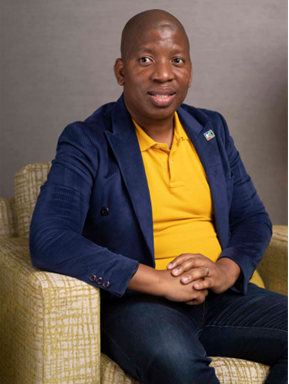 Shadrack Kubyane, Co-Founder Coronet Blockchain, South Africa
Shadrack Kubyane, Co-Founder Coronet Blockchain, South Africa
Shadrack’s journey departure commenced in corporate with entities like Deloitte, prior to co-founding Coronet Blockchain. An agile supply chain digital infrastructure leveraging blockchain technology to evolve Africa’s supply chains into equitable see-through supply chains for inclusive growth. Among leading Blockchain voices on the continent: he is called upon by governments, universities & the private sector to inform the configuration of practical solutions to meet the Africa Continental Free Trade (AfCFTA) 2035 priorities.
His corporate track-record includes spearheading specialist business development task teams that moved a new venture from a zero-balance-sheet position to a ZAR 5 billion front foot position. He is part of the National Working Committee Group on Data Science: curating 4th Industrial Revolution curriculum alignment to enable South Africa to compete on the global landscape. Coronet Blockchain is a B2B2C marketplace platform that provides blockchain vetted human hair extensions, haircare products & salon equipment to African salons, distributors & retailers from ethical global manufacturers at lower sourcing costs.
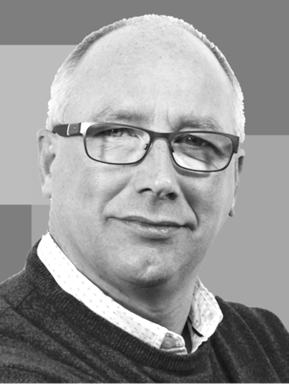 Ray Walshe, Director of European Observatory for ICT Standards (EUOS)
Ray Walshe, Director of European Observatory for ICT Standards (EUOS)
Ray is Senior Researcher in the ADAPT Research Centre in Dublin City University (DCU), IRELAND. He began his career in industry as a software engineer, software consultant and project manager with LM Ericsson, Software and Systems Engineering Limited and Siemens. Joining the School of Computing DCU in 1995 he delivers AI, IoT and Data Governance modules on Undergraduate, Masters, and PhD Programmes and is current (2021) Chair of the Graduate Diploma in Web Technologies. Ray is Chair of Big Data Value Association Standards Task Force, Chair of Network Development @ Gender Responsive Standards at the United Nations Economic Committee for Europe, Chair of the External Advisory Board of StandICT.eu, Research Partner in StandICT2023.eu and Co-Lead on ELITE-S Fellowship Programme for Emerging Technologies Standardization (Elite-Fellowships.eu). Ray has been a Digital Leader with World Economic Forum since 2016 and was appointed to the IEEE European Public Policy Committee on ICT in 2019 and is currently the AI WG Lead for IEEE EPPC. Ray was also appointed in 2020 to the OECD Network of Experts (ONE AI).
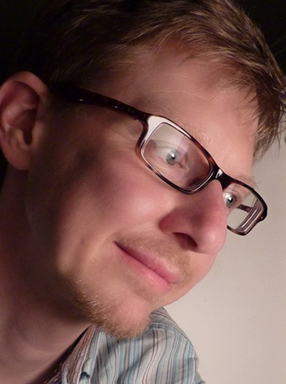 Heikki Almay, Co-founder, Karugrid (Finland) and Telecom Architect
Heikki Almay, Co-founder, Karugrid (Finland) and Telecom Architect
Heikki is passionate about turning mobile networks and off-grid systems into consumer products that can be installed and operated without technical expertise. He has more than 30 years of experience in telecom. He is one of the pioneers in IP connectivity for mobile networks, an area in which he at Nokia built significant new businesses partnering with IP and security specialists, such as Cisco, Juniper and CheckPoint. Prior to co-founding Poutanet, SmartPTO and Karugrid he was leading mobile network architecture design at Nokia and pushing open source and openness initiatives including the Telecom Infra Project (TIP).
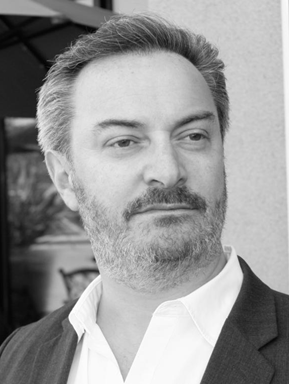 Jonathan Reichental, CEO, Human Future, USA
Jonathan Reichental, CEO, Human Future, USA
Dr. Jonathan Reichental is the founder of Human Future, a global business and technology advisory, investment, and education firm. Previous roles have included senior software engineering manager, director of technology innovation, and he has served as chief information officer at both O’Reilly Media and the City of Palo Alto, California. In 2013, he was recognized as one of the 25 doers, dreamers, and drivers in government in America. In 2016, he was named a top influential CIO in the United States and in 2017, he was named one of the top 100 CIOs in the world. He has also won a best CIO in Silicon Valley award and a national IT leadership prize.
Reichental is a recognized global thought leader on a number of emerging trends including urban innovation, smart cities, sustainability, blockchain technology, data governance, the fourth industrial revolution, and digital transformation. He holds several degrees including a Ph.D. in Information Systems. He is an adjunct professor in the School of Management at the University of San Francisco and instructs at several other universities. Reichental regularly creates online video courses for LinkedIn Learning.
Track Co-Chairs
 Joel Myers Joel MyersCEO, DOMILA Limited, Dublin, Republic of Ireland Co-Chair of the IEEE IoT Initiative Smart Cities Working Group |
 Mohamed Essaaidi Mohamed EssaaidiHead of the Smart Systems Lab and Former Dean, ENSIAS Founder & Former Chair of IEEE Morocco |
 Victor M. Larios Director of the Smart Cities Innovation Center (SCIC), The University of Guadalajara,Mexico |
Co-Chair Bios
Joel Myers: Leading technologist specializing in the creation and development of innovation technology solutions in the communications and management of services in Cultural Heritage, Tourism, and since 2015 in Business Networking.
His company, HoozAround Corp. is currently commercialising a mobile application called HoozAroundTM. This App offers very close-proximity networking for users to carry out business and social networking based on profile matching needs or interests in real-time, indoors and outdoors. Its aim is to bring people together that would otherwise never meet, face-to-face, in order to create new and more efficient opportunities to grow personally, socially as a city-wide community and in developing business. The app was successfully piloted at the IFA Berlin consumer electronics trade fair in 2017 and at the IEEE World Forum on IoT in February 2018 (Singapore).
Over the past few years Joel Myers has been focusing on the redefinition of the “Internet of People” exploring the goals of the smart city industry movement juxtaposed with the need for humanity to remain connected as physical people.
The work carried out by Joel Myers has been published in international newspapers and journals such as the BBC, New York Times, Hong Times, the Hindu Times, Wired, and Forbes Magazine.
Mohamed Essaaidi: Prof. Dr., IEEE Senior Member has been the Dean of ENSIAS College of Engineering of Mohammed V University, Rabat, Morocco since December 2011 and he was a Professor of Electrical & Computer Engineering at Abdelmalek Essaadi University, Morocco from 1993 till 2011. He is the founder and past Chairman of the IEEE Morocco Section (2005-2015), co-founder of IEEE Computer & Communication Societies Joint Morocco Chapter, IEEE Antennas and Propagation Society and Microwave Theory and Techniques Society Morocco Joint Chapter and EEE Education Society Morocco Chapter. He has been also the founding Director of the Morocco Office of Arab Science and Technology Foundation, ASTF (2006-2009) and the Coordinator of ASTF RD&I Network of Electro-Technology since 2006. He has also founded several IEEE Student Branches in different Moroccan universities and engineering schools. Furthermore, he has been a member of IEEE Global Committee on Accreditation activities since 2016. He has authored and co-authored 5 books and more than 200 papers in international refereed journals and conferences in the field of Electrical and Information and Communication Technologies. He has been the Editor-in-Chief of International Journal on Information and Communication Technologies, Serial Publications, India (2007-2011). He is also an active member of the editorial boards of several IEEE and other indexed international journals in the field of information and communication technologies. Prof. Essaaidi is the founder and the General Chair of several IEEE technically sponsored international conferences, including Mediterranean Microwave Symposium (since 2000), Information and Communication Technologies International Symposium (2005, 2007), International Conference on Multimedia Systems and Computing i(2009, 2011, 2012, 2014) International Renewable and Sustainable Energy Conference (2011, 2013, 2015) and International Conference on Complex Systems (2012, 2013, 2015). He has also been involved in the Organizing and Scientific Committees of several other international conferences held worldwide. He holds 10 patents in the field of Information and Communication Technologies. He was also a member of the IEEE 802.16 Sponsor Ballot Pool of IEEE Standard Association that defined the technical specifications for WiMAX. Prof. Essaaidi supervised several Ph D and Masters Theses and has been the principal investigator and the project manager for several international research projects.
Victor M. Larios followed a higher education degree program at the ITESO University in Mexico (B.Sc. in Electronics Engineering), graduating in 1996. In 1997 he received a M.Sc. at the Université de Technologie de Compiègne in France, and then went onto get a Ph.D. in Computer Engineering in 2001. Since 2004, has been a Full Professor at the Information Systems Department at the University of Guadalajara in Mexico.
In April 2014, Dr. Victor M. Larios founded and became director of the “Smart Cities Innovation Center (SCIC)” at the University of Guadalajara, where he leads a group of researchers in Smart Cities and Information Technologies. The SCIC is a think-thank to help government, industry, and other academic partners to join efforts to improve the quality life and social well-being within an urban environment, by using technology as the core driver for transformation.
His primary research interests are Smart Cities, IoT Distributed Systems, Networking, Multiagent Systems, and Data Visualization using Virtual Reality.
Dr. Larios has published more than 70 papers in international scientific journals and conferences, and has published a book on “Serious Games”. Dr. Larios has ongoing collaborations in projects with High Technology industry and government, using design thinking and agile methodologies to accelerate technology transfer in living labs.
As an entrepreneur, he is the founder and CIO of the consulting company, IDI Smart Cities, which collaborates with Advion Solutions LTD. in Finland. Its main activities are market research, promote scholarships to develop local talent, and support for international projects in Latin American countries and the European Union. One of its key efforts is to introduce the Circular Economic Model as a sustainability component for Mega-Cities.
As a volunteer, Dr. Larios leads technically on the Guadalajara Smart City project for the government, and international ONGs, such as the IEEE. Victor M. Larios is a Senior Member of IEEE with 29 years of membership. Since 2013, he has led the “Guadalajara Core City” in the IEEE Smart Cities Initiative. Dr. Victor M. Larios is also a guest editor at the IEEE IoT Magazine and has been the IEEE International Smart Cities Conference (ISC2), 2020 general co-chair.
Since July 2019 he has been working together with Joel Myers, Chair of IEEE IoT Initiative for Smart Cities, to develop the “Internet of People” (IoP). A people-centric approach to connecting people within cities to build opportunities and growth, on a business and social level. In March 2020 the first IoP pilot project was launched by the Mexican State Government of Jalisco in order to support and incentivise local economies and communities in recovering from the COVID-19 pandemic, through the IoP cloud/mobile platform and a pioneering digital micro-currency, called HooziesTM.
